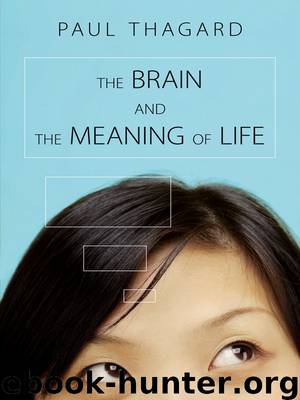The Brain and the Meaning of Life by Thagard Paul

Author:Thagard, Paul
Language: eng
Format: epub
Publisher: Princeton University Press
Conclusion
Decision making is usually not a step-by-step verbal argument or a mathematical calculation, but rather a mental parallel process of inference to the best plan. This process involves assessment of competing actions to determine which combination of them best accomplishes a person's goals. Goals are emotionally valued mental representations of imagined states of the world and self. The brain performs such representations by patterns of firing in neural populations in multiple brain areas, including ones that encode verbal and sensory information. Emotional value is part of the representation of goals and actions by virtue of coordination with brain areas such as the nucleus accumbens and the amygdala, which encode positive and negative aspects of the world. The overall assessment of the coherence of actions and goals is the result of parallel constraint satisfaction carried out by firing of neurons in all the relevant populations based on the synaptic connections among them. You don't tell your brain what to do, and your brain doesn't tell you what to do: you are your brain deciding what to do in your physical and social environment.
Because of the centrality of goals to decision making, a major part of rationality is the adoption, abandonment, and revaluing of goals. We adopt new goals because of biological needs and because they are subsidiary to goals we already have, but also through emotional social processes such as having people who care for us, role models, and people we care about. When we recognize that achievement of a goal is not possible or that situations have changed to make it no longer subsidiary to a higher goal, then it is rational to abandon the goal. The process of decision making, in which parallel constraint satisfaction is used to assess the coherence of actions and goals, can lead to the downgrading of the importance of some goals. Wisdom—knowing what matters—requires the adaptive capability of acquiring, abandoning, and revaluing goals.
The inherently emotional nature of decision making has important implications for many areas of human activity, including politics. The psychologist Drew Westen pointed out in 2007 the repeated failures of American political strategists who tried to approach voters through dispassionate, issue-oriented campaigns. He says that voters' decisions are based on answers to four questions. How do I feel about the candidate's party and its principles? How does this candidate make me feel? How do I feel about this candidate's personal characteristics, particularly his or her integrity, leadership, and compassion? How do I feel about this candidate's stands on issues that matter to me? Westen does not infer from the substantial evidence about the impact of emotions on voting the view that the Democratic Party he supports should ruthlessly exploit people's hopes and fears. Rather, he urges the party to select leaders who have the wisdom, integrity, and emotional appeal to convince voters to accept them based on their values and the best available evidence. The triumphant 2008 U.S. presidential campaign of Barack Obama showed the power of combining strong arguments with emotional magnetism.
Download
This site does not store any files on its server. We only index and link to content provided by other sites. Please contact the content providers to delete copyright contents if any and email us, we'll remove relevant links or contents immediately.
| Deconstruction | Existentialism |
| Humanism | Phenomenology |
| Pragmatism | Rationalism |
| Structuralism | Transcendentalism |
| Utilitarianism |
The remains of the day by Kazuo Ishiguro(8999)
Tools of Titans by Timothy Ferriss(8396)
Giovanni's Room by James Baldwin(7346)
The Black Swan by Nassim Nicholas Taleb(7129)
Inner Engineering: A Yogi's Guide to Joy by Sadhguru(6796)
The Way of Zen by Alan W. Watts(6614)
The Power of Now: A Guide to Spiritual Enlightenment by Eckhart Tolle(5782)
Asking the Right Questions: A Guide to Critical Thinking by M. Neil Browne & Stuart M. Keeley(5775)
The Six Wives Of Henry VIII (WOMEN IN HISTORY) by Fraser Antonia(5515)
Astrophysics for People in a Hurry by Neil DeGrasse Tyson(5190)
Housekeeping by Marilynne Robinson(4448)
12 Rules for Life by Jordan B. Peterson(4305)
Ikigai by Héctor García & Francesc Miralles(4274)
Double Down (Diary of a Wimpy Kid Book 11) by Jeff Kinney(4272)
The Ethical Slut by Janet W. Hardy(4253)
Skin in the Game by Nassim Nicholas Taleb(4250)
The Art of Happiness by The Dalai Lama(4130)
Skin in the Game: Hidden Asymmetries in Daily Life by Nassim Nicholas Taleb(4007)
Walking by Henry David Thoreau(3962)
